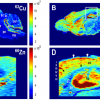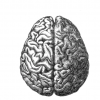SNP Snoop: BDNF and driving ability; failed road test?
 Could an alternative version of your brain-derived neurotropic factor be an excuse for your failed road test?
Could an alternative version of your brain-derived neurotropic factor be an excuse for your failed road test?
According to research published in the Journal, Cerebral Cortex, by Stephanie McHughen et.al., a key SNP in BDNF (valine 66 mutated to methionine) impacts learning and memory functions, cognitive tools which happen to be crucial for operating an automobile.
During one of the described experiments, subjects were seated at a computer, with attached steering wheel as they had to keep the virtual car on a black line in the center of the screen. Subjects got to learn the driving circuit by following the car on 15, 60 second trials. While both groups of subjects (those who had the “normal” valine allele, and those with the val66met SNP) started at similar levels of ability, and showed short term learning. During the trials however, val66met subjects showed less learning, and made more mistakes while learning. By day 5 of training, those with the val66met allele showed less ability to retain the skills they had learned. The study also showed some differences in the activation of regions of the brain responsible for motor function and learning, such as the motor cortex.
Having this SNP is not all bad, as the val66met SNP appears to be advantageous in disease settings, such as Alzheimer’s, Parkinson’s or multiple sclerosis, as it is thought that this SNP can increase the stability of certain brain functions, even though they may reduce plasticity in some learning tasks. In other words, this polymorphism may be the middle ground between flexibility and durability in brain functions.
I actually didn’t pass my road tests the first few times, and since my genotype happens to be heterozygous for this SNP I now have an excuse! My cello playing was never yo-yo ma, and but my teacher always commented that I had such a better time with difficult passages than simple ones. I wonder how this affects fine motor skills?
Jason – rs6265 (A/G)
| Print article | This entry was posted by Jason Williams on November 2, 2009 at 3:58 pm, and is filed under G2C Online. Follow any responses to this post through RSS 2.0. You can skip to the end and leave a response. Pinging is currently not allowed. |






